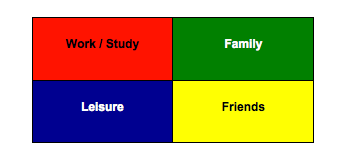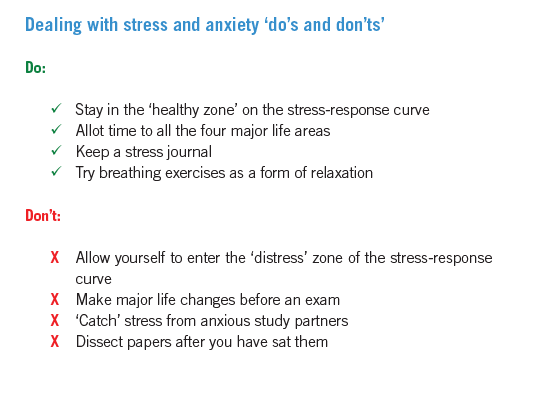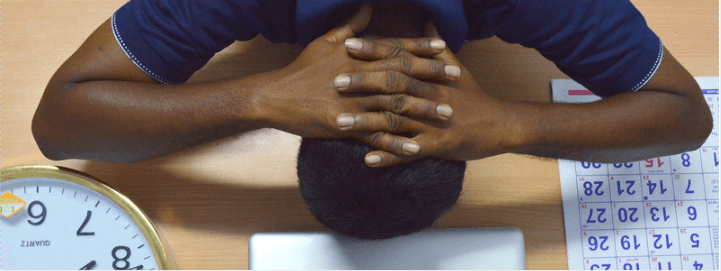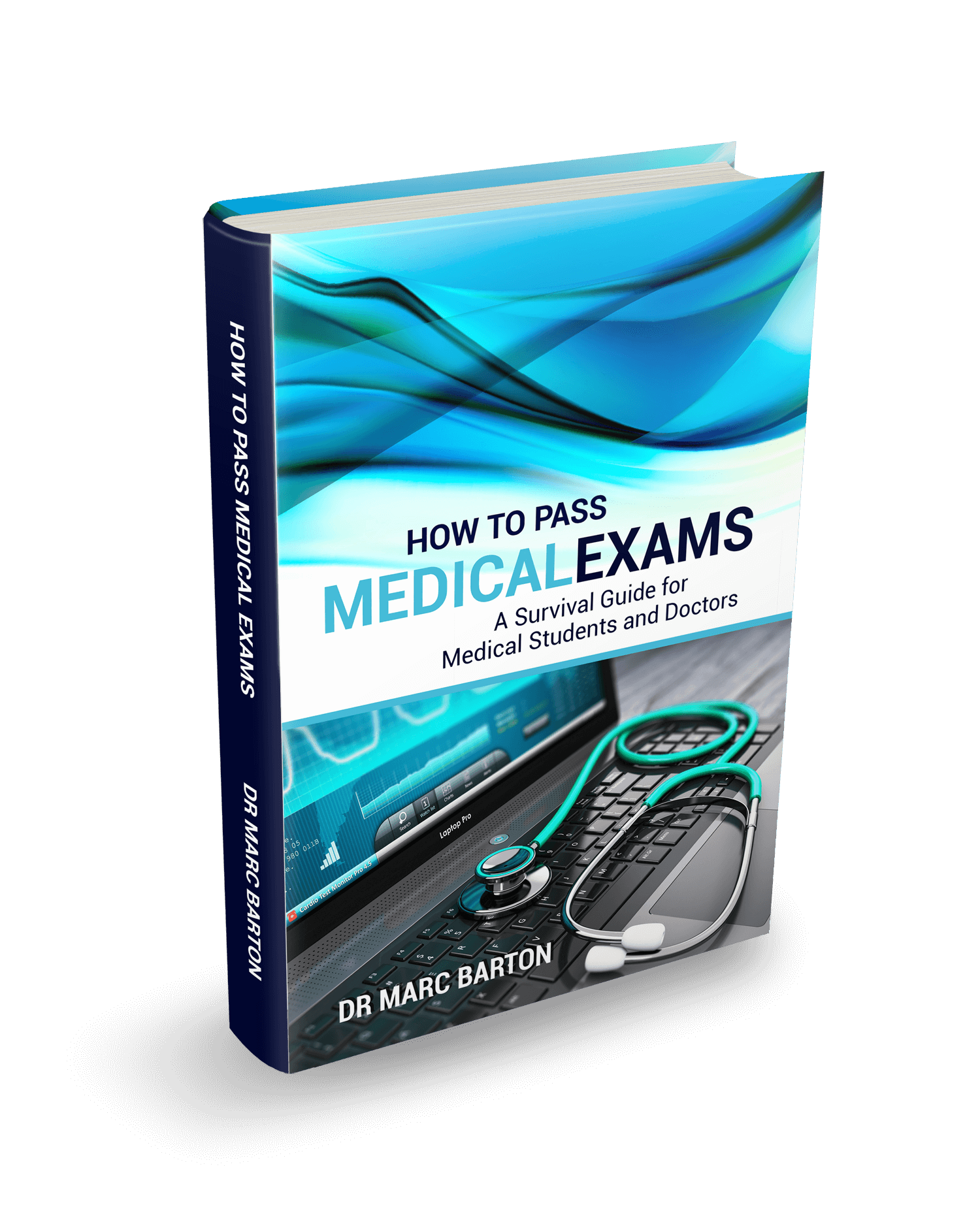“Adopting the right attitude can convert a negative stress into a positive one.” Hans Selye
Mental battles
Famed Endocrinologist Hans Selye, who conducted much work on stress and the human response to it, defined stress as “any event which may make demands upon the organism, and set in motion a non-specific bodily response which leads to a variety of temporary or permanent physiological or structural changes”. Put in simple terms, stress is your body’s way of responding to unpleasant demands.
Every student that sits an exam experiences stress and anxiety at some point. It is important to realize this and remember that you are not alone when you experience these feelings. The sheer quantity of knowledge that you are expected to learn as a medic can feel completely overwhelming at times and this in itself can be extremely stressful. Spending months locked up in a room and revising in every spare moment can cause the stress to become chronic and allow feelings of anxiety to set in.
On many occasions when preparing for exams I have personally experienced these feelings. I have allowed negative thoughts to spiral into fears of poor performance and failure. With time and experience, though, I learned to manage my stress extremely well and re-direct these feelings in a positive way that actually helped me to prepare more efficiently.
Understanding that these stresses are a normal response to your circumstances and having a basic knowledge of why you are experiencing these feelings can help you overcome them also.
Why are medical exams so stressful?
There is a tremendous amount riding on every single medical exam. When I sat the 2nd MB examination at the end of my first year in medical school it was with the knowledge that not everyone would make it through to the second year and that this would be the end of the road for some people. It had a notoriously high failure rate and, sadly, not everyone made the grade. Medical finals are the culmination of many years of hard work and study. When these have been passed, you can finally enter the medical profession as a doctor, a distinguished and respected position within society that you have been working towards your entire adult life. Passing a postgraduate exam can mean that you can enter a new job or specialty and this can have important career and financial implications. If you add all of this to the expectations that you put on yourself, and the inadvertent pressure of the expectations of family and friends, you have a perfect recipe for creating stress.
The quantity of knowledge required can also cause stress. Medicine is a vast topic and the amount that you have to learn can seem almost impossible at times. When the perceived demands upon you greatly exceed your perceived resources the stress is much more likely to feel uncontrollable.
Medical exams are also designed to be stressful, they are often considered to be a ‘rite of passage’ that actually assess your performance under stress. The examiners can go out of their way to make it difficult and challenging to see what you are made of. Medicine is a very stressful career and they want to see that you are the kind of individual that will be able to deal with these stresses.
Stress can be contagious too, and you should choose your study group partners cautiously. Being around an individual that is extremely stressed and having a lot of negative thoughts can easily rub off on you. I can recall one particular occasion when I was feeling fairly calm and confident about an upcoming exam. I then spent a few hours sitting and eating lunch with a friend that was extremely anxious about the same exam, and by the end of the lunch I was almost as anxious as him. Be very careful not to feed off the feelings of others around you.
After the exam can also be a very stressful time. It is very tempting to sit down with others that have sat the exam and dissect the paper. It will always seem like others have answered questions in a different way or have performed better than you. There is no point in ruminating over your answers now, and what is done is done. You have finished the exam and should take some time to relax. You may have more exams in this sitting and when this is the case you should move onto the next one, putting this one behind you.

‘The Scream’ by Edvard Munch. Many medics feel like this in the run up to their exams!
What causes anxiety?
Anxiety is the psychological component of the ‘fight or flight’ response and should be considered a natural response to stressful events. It is a complex and poorly understood condition but it is widely accepted to be caused by the discharge of a variety of neurotransmitters within the sympathetic nervous system.
It is thought that there is an over-activation of catecholamines from the adrenal medulla, particularly epinephrine and norephinephrine, and an under-activation of the serotoninergic neurotransmitter system. A combination of these results in a variety of emotional symptoms including poor concentration, feelings of fear and apprehension, and physical symptoms such as dry mouth, sweating, palpitations and bowel disturbances. Anxiety can also cause poor libido, sleep disturbance and associated feelings of depression.
It is therefore not difficult to see that allowing feelings of anxiety to set in and take over can be extremely counterproductive to exam preparation!
Make exam stress your friend
Some stress is actually necessary for optimum performance. The arousal stress-performance curve first created by Yerkes and Dodson in 1908, and later adjusted by Nixon in 1979, nicely demonstrates how stress affects performance:

It can be clearly seen from the graph that as stress increases so does performance. This is referred to as ‘healthy stress’ and this is the area that you should be aiming to remain within during your exam preparation. Just above the comfort zone is a sweet spot where performance will be optimized but ‘distress’ has not yet been reached. After the peak of the graph performance falls off dramatically and exhaustion, ill health and eventually breakdown occur.
Try to monitor your stress levels to ensure that you are remaining in the ‘healthy stress’ zone as much as possible. The good news is that the curve can be shifted to the right if the correct stress management tactics are employed.
Don’t make a bad situation worse
The first step to take in managing stress is to avoid things that could inadvertently make it worse. Avoid big lifestyle changes in the run up to the exam such as going on a diet or moving house. If you are planning on giving up smoking, a few weeks before the exam is not the best time to do it. If you enjoy exercising or playing sports, try to make time to continue with this, as it is likely that this is already a major stress coping mechanism for you.
Try not to disrupt the balance between the four major life areas too much. Under normal circumstances it is recommended that there is a fairly even balance between family, friends, work (this includes study) and leisure time:

Around exams it is very easy for this balance to become adversely disrupted and your study become the sole focus of your life, leaving no time for anything else:

Allotting time to all four facets of your life will keep your stress to a minimum but removing this important balance from your life will make things much worse. It is essential that your study time does not come at the expense of your family, friends and leisure time.
Stress management techniques
If you are feeling stressed and overwhelmed there are several tried and tested ways of improving the situation.
One of the most important facets of stress management is identifying the source of the stress. Much of your stress will be related to your exam preparation, but each of us has outside lives to balance as well. There may well be multiple factors contributing to the stress that you are experiencing at present and your study may well be ‘the straw that broke the camels back’.
Writing a ‘stress journal‘ can help you to identify the things that are causing you the most stress. Each time you feel stressed note it down in your journal and look for patterns that arise. Jot down what triggered the stress, how it made you feel and anything that improved it. Hopefully by doing this you can learn to avoid the situations that worsen your stress levels and raise your ability to cope with the stress that studying has caused.
If you feel extremely stressed during a particular study session, perhaps because of the complexity of a subject or simply because you feel like you are running out of time, then it is time to take a break. Trying to carry on studying whilst in this mindset is likely to be counterproductive. A change of scenery at this point in time can be very helpful and can assist with putting things into perspective. Get up and make a cup of tea, go for a walk outside or perhaps try doing some gentle exercise.
Tiredness and fatigue can increase stress and another way to reduce your stress levels is to take a short nap. A short 30-minute ‘power nap’ will help to recharge your batteries. There is a good reason why people in the Mediterranean take daily siestas in the afternoon. You will almost certainly feel more able to cope with an intense study session after one of these naps.
Stretching and massage therapy is another fantastic way to reduce your stress levels. Massage has additional values as well. Sitting hunched over a computer or textbook for many hours a day will increase tension in your neck and upper back and having a massage can help to significantly reduce this.
Breathing exercises can also help to reduce stress and can help you to feel calmer and more able to cope with the situation at hand. Try sitting in a warm, quite place in a comfortable chair. Relax your body as much as possible and then start to regulate and slow down your breathing. Breathe in through your nose and out through your mouth to create a ‘circular pattern’ to your breathing. With each in-breath visualize that you are inflating your lungs completely and with each out-breath visualize that you are emptying all of the air out. Try doing this for around 5 minutes a couple of times a day when you are feeling particularly stressed about your upcoming exam.

Medical Exam Prep would like to thank Dr. Marc Barton for permission to reproduce this extract from his book ‘How to Pass Medical Exams: A Survival Guide for Medical Students and Doctors’.
About Dr. Marc Barton
Dr. Marc Barton qualified from Imperial College School of Medicine in 2001. Since that time he has worked in a variety of different medical specialities. He worked as a GP partner from 2006 until 2008 and more recently as a higher specialist trainee in Emergency Medicine.
‘How to Pass Medical Exams’ is available for purchase here.






